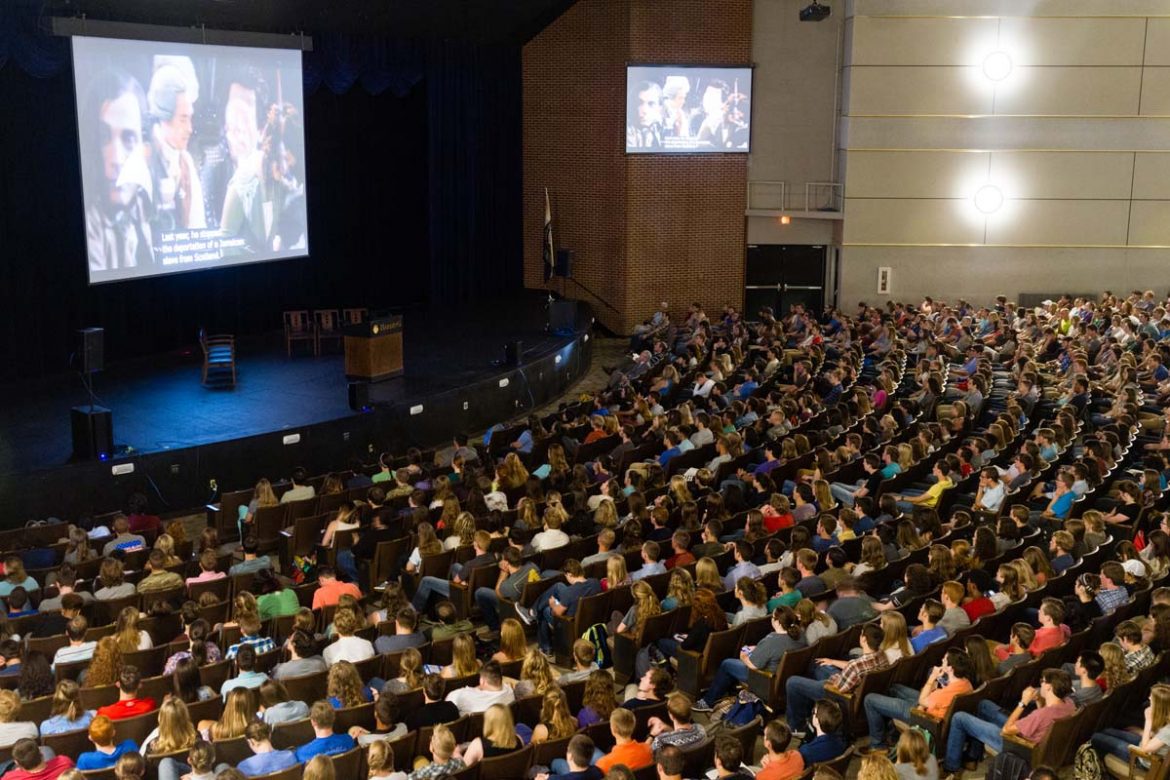Dr. Bruce McLarty has invited students, faculty and the entire Harding community to be part of a new program called Harding Read. McLarty chose the book “Amazing Grace: William Wilberforce and the Heroic Campaign to End Slavery” by Eric Metaxas to be featured as Harding’s first-ever campus read. The program encourages students to read this book together and participate in a community conversation.
“When I read the book, my mind would run from one department to another, thinking about all of the ways this book intersects with every area of campus,” McLarty said. “A lot people who have read the book have said this is the perfect book. It just fits Harding, and at this time in history there couldn’t have been a better book.”
Representatives of First Year Experience, the Brackett Library and the American Studies Institute (ASI) proposed the idea of a campus read to McLarty last semester. Kim Kirkman, associate executive director of ASI, had a hand in the creation of this program.
“It just has so many different layers that it brings to the community,” Kirkman said. “It’s amazing because we sat in this office, kind of saying, ‘What if?’ and ‘Could this happen?’ and never imagined how big it would be today.”
Students new to Harding were introduced to the program during the Summer Stampede sessions, where the Brackett Library handed out 965 copies of the book.
The program offers many other ways to get involved besides reading the book, including an online discussion for alumni moderated by former Student Association presidents. Faculty and administration are incorporating the story into classrooms and chapel as well. On Jan. 12, “Amazing Grace” author Eric Metaxas will speak on campus during the American Studies Institute Distinguished Lecture Series.
“This, for ASI, is forming a connection,” Kirkman said. “Students can say, ‘I’ve read this guy’s book, now I want to go see him.’ They can feel personally connected. It can bring in people who don’t have the same major or interests or friend groups and will give us all one more thing in common.”
Senior Rebecca Mahle began reading “Amazing Grace” for class but said she would recommend everyone read it simply to be a part of the conversation.
“I think it’s really cool that our whole community is coming together and studying something as important as what really happened with the slave trade,” Mahle said. “I think those are really important conversations that we need to have and literature can do so much to foster those conversations.”
McLarty said there were several reasons that seemed to make this particular book a perfect fit for Harding, one being his own appreciation for missionary biographies. While he attended graduate school at Harding School of Theology, McLarty was asked by his professor to read a missionary biography.
“My teacher told me that he has never gotten more positive impact on any assignment as he gets on that one little thing: a missionary biography,” McLarty said. “I read one on William Carey, and William Carey has lived with me ever since.”
Another reason, McLarty said, that he chose the story of Wilberforce was because he was such a social reformer of his time and he, along with his allies, were motivated by faith. McLarty said he recognizes that students today seem to have a heart for addressing social ills. But the final reason McLarty wanted to share this story with the student body was because of what it says about leadership.
“(Wilberforce) was vilified during his life, and as we talk about him today we think of him as this wonderful hero,” McLarty said. “Yet during his lifetime, people said horrible things about him. What that would mean to a campus of leaders is that if you lead, you will be criticized.”
Kirkman said the most amazing thing about Wilberforce is that he made it his mission in life to stop the slave trade in the British Empire.
“That is something that permeates through every department on campus. Whether you’re in nursing or teaching or social work, you can see how one person can make a difference,” Kirkman said. “Sometimes we feel so small and ineffective. Even though his name may not be well known, what happened and what he did is still known to this day.”
Over the summer break, McLarty took a trip to England to visit several sites that are significant to the life of Wilberforce. McLarty stood at Wilberforce’s grave site, saw the grammar school he attended, read some of Wilberforce’s handwritten journals and more. Upon his return to Harding, McLarty wrote and published a few blog posts on the Harding website. He shared the link on his Instagram account and encouraged students to read about his search for Wilberforce.
“I think it can potentially be a very unifying thing for campus. A big piece of shared experience that, years from now, (people will ask) were you on campus the year we focused on Wilberforce?” McLarty said. “I think that will be a real bond, going forward.”
